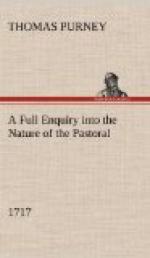Cubbin was strangely taken with the mild Address and Sweetness of Sophy. A thousand times he thanked him, as often smil’d upon him, and spread his Coat for him to set more soft upon the Sands.
Sophy was a true-born Britton, and admir’d a forward Spirit. The French he little loved; Their Poets dare not (said he) think without the Ancients, and their Criticks make use of their Eyes instead of their Understandings. ’Twas his way to pardon, nay admire a Critick, who for every fifty Errors would give him but one Remark of Use, or good Discovery. But always read one Sheet, then burnt those dull insipid Rogues, who thought that to write a good was to write a faultless Piece. By which means their whole Work becomes one general Fault.
This Censure, I fear, would fall pretty heavy on the [A]_Criticks_ of France; if this were a proper Place to persue the Argument in. But Sophy thus resum’d his Talk.
[Footnote A: In the Preface to the Second Part of our Pastorals, viz. THE BASHFUL-SWAIN, and BEAUTY AND SIMPLICITY, we have shown to what Perfection the whole Science of CRITICISM was brought by the Ancients, then what Progress the French Criticks have further made, and also what remains as yet untouch’d, and uncompleat.]
In this, said he, I like your Temper, Cubbin. By those few Pieces we have seen of your’s, and those I hear you have in Manuscript, you seem determin’d to engage in those Kinds of Poetry and those Subjects in Criticism, which the Ancients have left us most imperfect. Here, if you fail, you may be still some help to him who shall Attempt it next; and if all decline it, apprehensive of no fair success, how should it ever attain Perfection.
Then Cubbin told the Critick, that the reason of his entering upon Pastoral, where the Labour was excessive and the Honour gain’d minute, was this; He had unhappily reflected on that thing, we call a Name, so thoroughly, and weigh’d so closely what like Happiness it would afford, that he could now receive no pleasure from the Thoughts of growing famous; nor would write one Hour in any little kind of Poetry, which was not able to take up and possess his Mind with Pleasure, tho’ it would procure him the most glaring Character in Christendom. This Temper was especially conspicuous while he tarried at the Fountain where he imbibed the little Knowledge he possesses. He seem’d as out of humour with Applause, and dafted aside the Wreath if ever any seem’d dispos’d to offer it.
I’ faith, said Cubbin, I am nothing careful whether any Pastorals be cry’d up or not. Were I dispos’d to write for a Name, no whit would I engage in either the Sublime or Soft in Writing: For as the middle Way, made up of both, is vastly easiest to attain; so is it pleasant to the most Imaginations, and acquires the widest Character.
There are originally, answer’d Sophy, no perfect and real Kinds of Writing but them two. As for the Strong Lines, ’tis supplying the want of the Sublime with the Courtly and Florid Stile; as what we usually call the Fine and Agreeable is but bastard and degenerate from the truly Tender. But yet it must be added that this suits the Populace the best.




